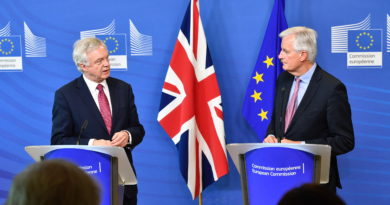Brexit agreement on citizens’ rights has “shortcomings”: EU parliament report
A report for the European parliament says that the draft withdrawal agreement negotiated by the UK and the EU contains “serious shortcomings” on citizens’ rights.
The study was produced by researchers from Radboud University Nijmegen in the Netherlands for the parliamentary committee on civil liberties, justice and home affairs. The research recognises that, when it comes to citizens’ rights, the objective of Brexit talks was to “limit to a minimum the disruption” for EU nationals living in the UK and British residents in the EU. In this respect, the draft deal “provides a good basis” as it ensures the continuation of existing rights and safeguards on compliance, says the report. But the draft agreement is far from perfect.
A major shortcoming is that the agreement is limited to people who reside outside their home country, according to the study. This means that British nationals living in the EU will not be able to rely on the jurisprudence of the European Court of Justice with regard to family members from third countries, if they return to the UK. The deal also fails to secure the right of free movement in the EU for UK nationals.
The study says, however, that this part of the withdrawal agreement could “serve as a useful model” in case of a no deal. For example, it could be incorporated in UK law to protect the status of EU nationals in the UK, be turned into a special instrument to protect the rights of UK nationals in the EU or be used in a separate EU-UK agreement dealing only with citizens’ rights.
More calls for protection
Calls to protect people directly impacted by Brexit keep mounting. This week, during a visit to London, King Willem-Alexander of the Netherlands said that the 50,000 British nationals based in Holland and the 150,000 Dutch nationals in the UK “deserve special attention”. The King said in a speech in Westminster:
Many of them have lived and worked there for many years. They feel at home in their local community and their contribution to society is valued, whether as employees, colleagues, neighbours or volunteers. […] Yet all these individuals now live under the shadow of uncertainty about their future status. I understand how difficult this is for them and I trust that this uncertainty will be resolved.
Also in London, Czech Prime Minister Andrej Babiš said he was concerned about the impacts of a no deal Brexit on the Czechs community, according to Radio Praha.
London Mayor Sadiq Khan discussed in Brussels the concerns of EU nationals living in the British capital.
I had a productive meeting with @MichelBarnier this morning. Important he hears Londoners’ concerns – including the 1 million EU citizens in our city – who are worried we are heading towards a bad Brexit deal, or no deal, which would be hugely damaging for London #LondonIsOpen pic.twitter.com/6L8qHT1cpa
— Mayor of London (@MayorofLondon) October 26, 2018
During a cross-party visit to EU chief Brexit negotiator Michel Barnier, Vince Cable, the leader of the Liberal Democrats, insisted on “ringfencing the rights of British citizens in the EU and vice versa in the event of a no deal.”
Guy Verhofstadt, Brexit coordinator at the European parliament, said in a debate that a deal can be reached. He added that the UK would be prepared to grant a lifelong right to return for EU nationals (based on the withdrawal deal they would lose residence rights after 5 years of absence). In exchange, the EU should grant free movement rights to British citizens already living in the EU.
A #Brexit deal can be reached as it’s in the mutual interest, but one last push on #citizensrights will help: an offer of unlimited onward movement for UK citizens in EU27, in exchange for lifelong return to the UK for EU citizens. I know the UK could agree, so let’s deliver it.
— Guy Verhofstadt (@guyverhofstadt) October 24, 2018
Claudia Delpero © all rights reserved.
Photo via Pixabay.




